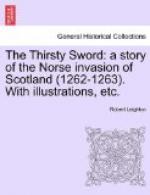“You are over hard upon my brother,” said Kenric. “There lives not a man in the Western Isles better fitted than Alpin for the great office of kingship. He is just, and noble, and trusty. No man in all Bute can say that he ever broke a promise or told an untruth. Think you that because he is hasty with his dirk he is therefore a thoughtless loon, who knows not when a gentle word can do more service than a blow? When did he ever draw dirk or sword without just cause? You do not know him as I do, Dovenald, or you would not breathe a word in his dispraise. And if my gentle mother loves him above all else next to my father, whom she has now lost, who shall say that Alpin is not deserving of her great favour?”
The old retainer walked on in silence.
Presently he turned to Kenric and said: “What has your brother done with the weapon wherewith my lord was slain? He tried in the dead of night to gain entrance to the traitor Roderic that he might use that fatal knife even as my lady so weakly charged him to do. Where is it, I say?”
“I know not,” said Kenric. “But methinks ’tis a pity he did not drive it into the villain’s heart.”
“My son! my son! let me not hear you utter such evil thoughts again. It ill becomes a pupil of our holy abbot to speak thus. And yesternight you were disposed to leave the guilty earl to whatever punishment the wise men should appoint.”
“Reflection has changed me, Dovenald; and were Roderic before me at this moment I would willingly lay him dead at my feet. Should Alpin fail to slay him, then will I fulfil my revenge. In fair fight or by stealth Roderic shall surely die.”
“Alas, that I should ever hear such words from one so young!” murmured Dovenald.
And the old man continued his complaints until they had entered the castle gates.
CHAPTER VIII. AN ERIACH FINE.
Under the clear sky of high noon the people of Bute had assembled on the great plain of Laws, at the margin of Loch Ascog. They had come from all parts of the island, for the word had travelled round with the swiftness of a bird’s flight that their good king, Earl Hamish, had been cruelly slain by his own brother, and all were eager not only to see the man who had done this treacherous deed, but also to hear judgment passed upon him for his crime.
At the foot of the great standing stone Sir Oscar Redmain, as steward or prefect of Bute, took his seat as judge. Noble and comely he looked, holding his great glittering sword, point upward, waiting for the prisoner and his accuser. At his right stood Godfrey Thurstan, the good abbot of St. Blane’s, with his cowl drawn over his reverend head to shield him from the warm sun. At his left Dovenald, most learned in the laws of the land, ready to explain and discuss the ancient legal customs; and round them in a circle were the others of the twelve ruthmen. The witnesses or compurgators stood in an outer ring within a fencing of cords running from stake to stake. Without the verge of the sacred circle of justice were gathered a great crowd of islanders — herdsmen and husbandmen, tribesmen, fishermen, and thralls — who had left their labours on hill and in vale, or on the sea, and come hither crying out loud for speedy vengeance.




